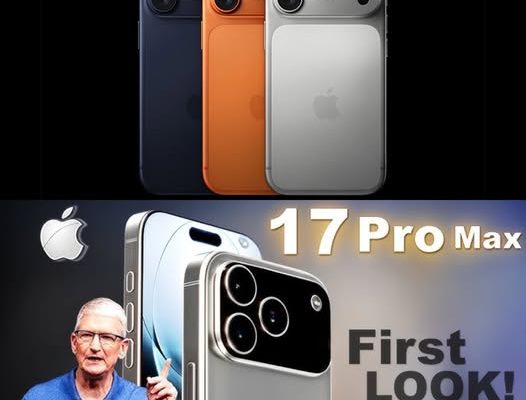Breaking News: Samsung Slams iPhone 17 Over “Serious Flaw” Hours After Launch — Recall Rumors Spread
By [Your Name]
In a move that shocked both the tech industry and Apple’s loyal fan base, Samsung broke its silence only hours after Apple unveiled the iPhone 17 — publicly pointing out what it called a “serious flaw” that could force Apple into the unthinkable: recalling its brand-new flagship smartphone.
The claim, whether a calculated marketing jab or a genuine warning, ignited a firestorm across social media, tech forums, and news outlets worldwide. Customers who had just pre-ordered the phone began to question whether their new devices might already be destined for return boxes. Analysts scrambled to interpret the rare, aggressive public statement from Apple’s fiercest rival.
The Flaw That Sparked the Firestorm

According to Samsung’s statement, the flaw lies in the design of the iPhone 17’s USB-C port — a centerpiece of this year’s launch, as Apple leaned heavily into its first truly universal charging design. Photos from early adopters had already circulated online, showing ports that appeared misaligned with the chassis. At first, many dismissed the issue as cosmetic.
But Samsung went further, alleging that the misalignment isn’t just aesthetic — it could cause long-term damage to charging cables, inconsistent power delivery, and even overheating.
“Apple has rushed thinness over reliability,” Samsung’s spokesperson said in a briefing. “This isn’t simply about a crooked port. It is a design compromise that risks durability and safety.”
That one sentence sent ripples through the industry. If proven true, Apple could be looking at one of the most embarrassing setbacks in its history.
A Rivalry with High Stakes
The rivalry between Apple and Samsung is decades old, with each launch season marked by subtle jabs and bold comparisons. But this time, Samsung’s critique carried a new weight.
The iPhone 17 launch was intended to reset Apple’s dominance in the smartphone market after lukewarm reviews of the iPhone 16. Its “iPhone Air” variant — thinner than any previous model at just 5.6 millimeters — was supposed to be the showstopper. Apple executives on stage celebrated it as “the future of design.”
Now, critics are saying that pursuit of thinness may have been its downfall.
“Apple’s obsession with shaving millimeters has always had consequences — from smaller batteries to bending phones,” said tech analyst Richard Hammond. “But if this port issue is as widespread as Samsung claims, we may be looking at Apple’s first major recall of a flagship.”
Early Customer Concerns
On social media, the reaction was immediate.
-
Hashtags like #iPhone17Flaw and #RecallApple trended worldwide.
-
Customers posted close-up images of their devices showing USB-C ports sitting at awkward angles.
-
Others reported difficulty inserting cables fully, or “wobbling” connections that sparked concern about durability.
One user wrote on X: “I just unboxed my iPhone 17 Air. The port looks off-center. Plugging in feels loose. If this is what I paid $1,099 for, Apple owes us answers.”
Another user shared a video showing a charging cable failing to seat properly, sparking debates over whether the issue was isolated or systemic.
Could This Trigger a Recall?
Recalls in the smartphone industry are rare, and for Apple — whose image relies on seamless design and premium reliability — they’re nearly unthinkable. Yet history shows they’re not impossible.
In 2010, Apple faced “Antennagate,” when users discovered the iPhone 4 lost signal when held a certain way. The company stopped short of a recall but distributed free cases. In 2016, Samsung itself faced its infamous Galaxy Note 7 recall, after battery defects caused overheating and explosions. That recall cost Samsung billions and reshaped its reputation.
For Apple, a recall of the iPhone 17 would be catastrophic — not only financially, but symbolically. It would hand Samsung and other rivals a weapon of unmatched power in the ongoing smartphone wars.
“Samsung knows exactly what it’s doing by pointing this out,” said analyst Emily Chen. “They lived through the Note 7 nightmare. If they can frame Apple as heading toward the same fate, it’s a PR coup.”
Apple’s Response
As of now, Apple has not issued an official statement about Samsung’s allegations. The company has traditionally taken time to address early controversies, preferring quiet internal investigations before public acknowledgment.
However, insiders report that Apple engineers are already testing retail units for stress and wear. Support channels have also received a spike in inquiries, though no official troubleshooting steps have been published.
Tech journalists reached out to Apple, but the company’s only reply so far has been: “We are aware of certain customer reports and are actively reviewing them.”
What Experts Say
Experts remain divided on whether Samsung’s claims are exaggerated or grounded in genuine risk.
-
Supporters of Samsung’s view argue that the physics of ultra-thin devices make durability challenges inevitable. A misaligned port could compromise electrical contact, leading to overheating or eventual failure.
-
Skeptics accuse Samsung of exploiting minor design imperfections for competitive advantage. “Apple has weathered bigger controversies,” said tech writer Michael Harrington. “Until we see evidence of widespread functional failure, this is just noise.”
Still, even skeptics admit the optics are damaging.
“Apple’s brand is built on precision,” Harrington added. “A crooked port — however minor — undermines that promise.”
The Recall Question
If Apple were to recall the iPhone 17, the move would follow strict criteria:
-
Safety Risk — Evidence of overheating, sparking, or fire hazards.
-
Functional Failure — Widespread inability to charge or sync devices.
-
Regulatory Pressure — Intervention by agencies such as the U.S. Consumer Product Safety Commission or European watchdogs.
-
Legal Exposure — Class-action lawsuits from early buyers demanding accountability.
At present, none of these conditions have been publicly confirmed. But if Samsung’s allegations gain traction and customers continue posting evidence, pressure could mount quickly.
Stock Market Reactions
News of Samsung’s statement rattled investors.
-
Apple’s stock dipped 2% in after-hours trading, erasing billions in market value.
-
Samsung’s shares rose modestly, with analysts citing “market confidence in Samsung’s aggressiveness.”
-
Component suppliers tied to Apple also saw declines, as fears of reduced iPhone shipments loomed.
Wall Street analysts warn that a full recall could cost Apple upwards of $5–7 billion, depending on replacement logistics and legal settlements.
Samsung’s Strategic Gamble
Why would Samsung take such an aggressive public stance? Industry observers point to several motives:
-
Timing — Striking Apple just hours after its launch ensures maximum disruption.
-
Positioning — Samsung’s foldable Galaxy Z line has emphasized durability and innovation; highlighting Apple’s alleged fragility strengthens that contrast.
-
Revenge — After years of Apple mocking Samsung’s design choices (such as big screens and styluses, both later adopted by Apple), Samsung may relish the chance to play offense.
“This isn’t just about pointing out a flaw,” said Chen. “It’s about narrative control. Samsung wants to own the story of the iPhone 17 launch.”
The Human Side
Beyond the corporate strategies and market numbers, millions of consumers now feel uneasy. For many, buying an iPhone is both a financial and emotional investment. The thought of a recall leaves early adopters frustrated and betrayed.
“I lined up overnight,” said Julia Martinez, a college student in Los Angeles. “I wanted the iPhone 17 Air because it’s the thinnest phone ever. Now I’m worried it won’t even last the year.”
What Happens Next
All eyes now turn to Apple. Will the company dismiss Samsung’s claims as opportunistic attacks, or will it launch a formal review?
History suggests Apple may quietly investigate before making a public statement. But in the era of instant social media outrage, silence carries its own risks.
“Every hour Apple waits, the narrative hardens,” Hammond noted. “If Samsung’s claim dominates the news cycle, Apple will have lost before it even responds.”
Conclusion: A Launch Overshadowed
What was supposed to be Apple’s triumphant leap into a new design era has already been overshadowed by controversy. The iPhone 17’s launch day — meant to showcase innovation and inspire customer loyalty — is instead being remembered for Samsung’s devastating critique.
Whether the flaw is catastrophic or cosmetic remains to be seen. But one truth is clear: the battle between Apple and Samsung has entered a new, sharper phase. And this time, it’s not just about features — it’s about survival in the court of public opinion.
As one analyst put it: “If Apple blinks, Samsung wins. If Apple recalls, Samsung wins. The only way Apple wins now… is if the flaw isn’t real.”
For now, millions of iPhone buyers wait anxiously, holding their sleek new devices in hand — and wondering if they are already broken.




